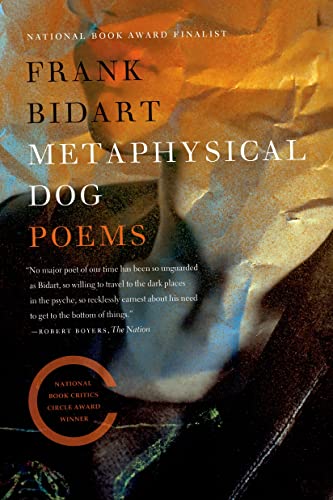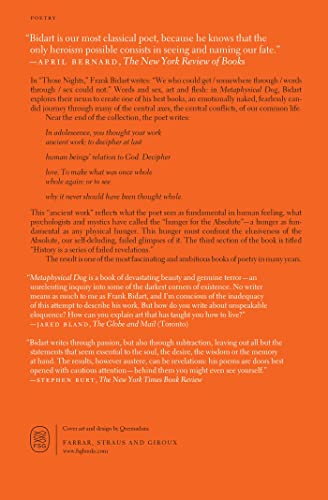


Metaphysical Dog: Poems
G**G
Thirty-nine Poems Read as One
Reading Frank Bidart's new collection of poems Metaphysical Dog, I learned something about how I read poetry. I learned from the absence of something.In reading a poetry collection, I usually look for one poem, any poem, that will center the entire collection for me. It might be the title poem, though it often isn't. But one poem becomes, for me, the filter for the rest, a kind of prism of understanding what the poet has done with the poems he or she has included in this particular collection. I admit that this may be a practice peculiar to me.I didn't find that one poem in reading "Metaphysical Dog:Poems," even after reading it three times.However, I had a fall-back position. I ended up reading the collection of 39 poems as a single poem, each individual part blending into what preceded and what came after. I don't believe Bidart wrote the poems that way, but that is how I ultimately understood the collection.Collectively, and even when I break them apart individually, these poems pack a powerful emotional wallop. You begin the reading the first poem, the title poem, and without realizing it you're soon hurtling through a highly personal, highly emotional experience.The poems range across the poet's life, not in chronological order but in what might be called an increasing intensity of experience. Here's "Like," which comes early on in the poems:Woe is blunted not erasedby like. Your hands were too full, thenempty. At the grave'slip, secretly you imagine thenrefuse to imaginea spectreso like what you watched die, the uniquesoul you loved endures a second death.The dead hate like, bitterwhen the living with too-smallgrief replace them. You dreadloving again, exhausted by the hungersineradicable in his presence. You resiststrangers until a stranger makes the old hungersbrutally wake. We live by symbolicsubstitution. At the grave's lip, what isbut is not is whatreturns you to what is not.From there, Bidart doesn't move forward or farther; he moves deeper, deeper into family, self, and gender confusion followed by acceptance (although acceptance arrives before confusion). He talks about, with, and to Walt Whitman, whom he could have been referring to in "Like." He travels toward the absolute and then away from it.He arrives, in "Of His Bones Are Coral Made," at transformation, and it is an arrival at the end of his life, not at the beginning:He still trolled books, films, gossip, his ownpast, searching not just forideas that dissect the mountain thatin his early old age he is almost convincedcannot be dissected:he searched for stories:stories the pattern of whoseknot dimly traces the patterns of his own:what is intolerable inthe world, which is to sayintolerable in himself, ingested, digested:the stories thathaunt each of us, for each of usrip open the mountain...The four poems that follow are not so much post-climactic as they are a quiet acceptance and understanding.Bidart has written numerous collections of poetry and received many awards, including the Wallace Stevens Award and the Bollingen Prize. He is a "presence" in contemporary American poetry, but more than that, he continues to create collections like Metaphysical Dog that perplex, amaze, provoke, and then, oddly, bring calm and understanding.
C**Y
I'm no scholar of poetry...
...but this work by Bidart brought me wonder, some tears, catharsis, hunger and ecstasy. It is an extremely personal journey that the poet looks back on, and shares here. This book of poems, each building into the next, gave me hope that if the "texting generation" discovers the bones of the English language, the written word may survive! Bidart can say more with less than anyone.
D**E
A quieter voice
Like most poets I have admired Frank Bidart from the magnificent "Ellen West" onwards. The poems of "Metaphysical Dog are poems that are less performance and more direct. They possess a kind of wisdom one hopes for from age and experience ,although they are given over to a sense of ars poetica. The voice speaks quietly and more in the revelations of long discussion, rather than bombastic confession. As a reader, I would have been pleased if this volume added another dramatic persona to Mr.Bidart's cast of voices from beyond the margin, but this voice is satisfying enough. The poems move at a more rapid self conscious pace through history of character sketches and episodic contemplations revealing the act of revelation to be another fiction but the one where "...I had found my work." [History]. He reflects as anyone who has passed through the experience of themselves must and gleans found moments. He examines the life of his language and returns to his inspirations sex, god and art with grateful yearning.
L**N
Beautiful
This is a heartbreakingly beautiful book of poetry. For anyone who appreciates modern, lyrical, emotional, observational poetry, this is a must.
J**R
Highly Recommended
Probably the best book by Frank Bidart.
Trustpilot
1 month ago
1 week ago